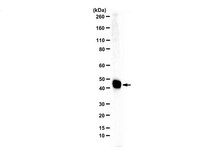ABS2124 Sigma-AldrichAnti-Ferrochelatase
Anti-Ferrochelatase, Cat. No. ABS2124, is a rabbit polyclonal antibody that detects Ferrochelatase, mitochondrial. It has been tested for use in Immunoprecipitation and Western Blotting.
More>> Anti-Ferrochelatase, Cat. No. ABS2124, is a rabbit polyclonal antibody that detects Ferrochelatase, mitochondrial. It has been tested for use in Immunoprecipitation and Western Blotting. Less<<Recommended Products
Áttekintés
| Replacement Information |
|---|
Kulcsspecifikációk táblázata
| Species Reactivity | Key Applications | Host | Format | Antibody Type |
|---|---|---|---|---|
| M, H | WB, IP | Rb | Serum | Polyclonal Antibody |
| References |
|---|
| Product Information | |
|---|---|
| Format | Serum |
| Presentation | Rabbit polyclonal antiserum with 0.05% sodium azide. |
| Quality Level | MQ100 |
| Physicochemical Information |
|---|
| Dimensions |
|---|
| Materials Information |
|---|
| Toxicological Information |
|---|
| Safety Information according to GHS |
|---|
| Safety Information |
|---|
| Packaging Information | |
|---|---|
| Material Size | 100 µL |
| Transport Information |
|---|
| Supplemental Information |
|---|
| Specifications |
|---|
| Global Trade Item Number | |
|---|---|
| Katalógusszám | GTIN |
| ABS2124 | 04054839223600 |
Documentation
Anti-Ferrochelatase MSDS
| Title |
|---|
Anti-Ferrochelatase Certificates of Analysis
| Title | Lot Number |
|---|---|
| Anti-Ferrochelatase - 3776097 | 3776097 |
| Anti-Ferrochelatase Polyclonal Antibody | 3060545 |
| Anti-Ferrochelatase Polyclonal Antibody | Q2865521 |








